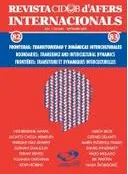Open Cultural Spaces in Search of New Frontiers

Crossing cultural borders opens up a new creativity, new expectations and new emptiness that provoke fear and existential nausea. Are we lost forever, in a specific historical time, in a specific culture, or in a specific geographical location? Are we forgotten in transitions, translations and intercultural misunderstandings? Are we bound to remain foreigners forever? In order to provide some answers, we hurriedly establish new borders and define new relations between the recently-established entities, a new creativity or a new understanding and knowledge that can help us to survive the confrontation with a limitless nihility. In the age of globalisation, an increased effort to position cultural creativity and cultural identification within the local, now multicultural and largely redefined context, is strongly felt. How does this affect people and societies? What are the limits of transgressions between cultures and different cultural values? How can the new cultural identities be redefined? The answers to these questions can turn out to be very different, but they seem to be confined to at least two already discernible directions: cultural hybridisation (García Canclini) and the emergence of virtual cultures that promote de-standardised identities.
Key words: Boundaries, communication, cosmopolitanism, cultural consumption, cultural diversity, cultural identity, multiculturalism